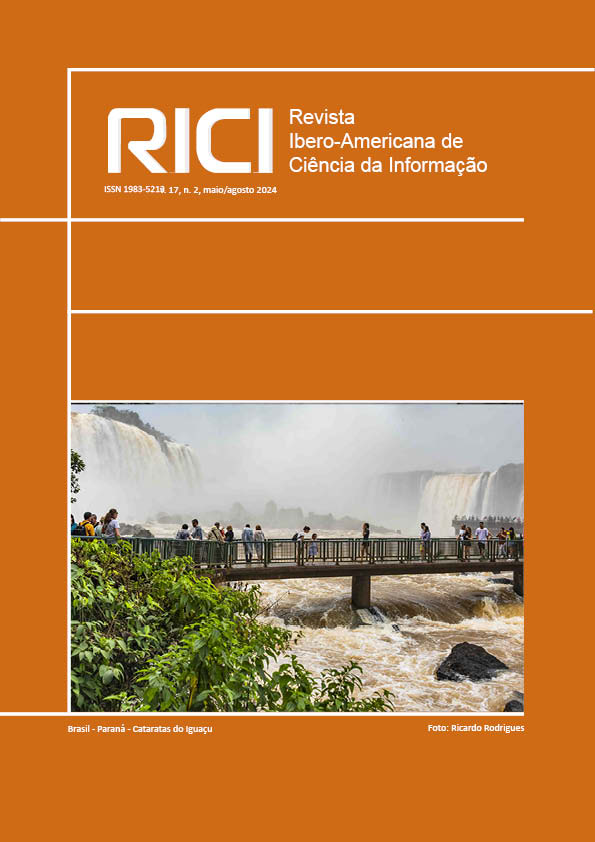Informational behavior and information anxiety in stricto sensu graduate students: a preliminary study of informational subjects on social networks.
DOI:
https://doi.org/10.26512/rici.v17.n2.2024.53692Keywords:
Informational anxiety, Informational behavior, Informational normosis, Social networksAbstract
Exposure to information overload, Information and Communication Technologies (ICTs), and the connection to virtuality are increasingly prevalent in academic settings, particularly among students, making them vulnerable to the phenomenon of information anxiety. In this regard, the possibility of identifying triggering behaviors of this phenomenon in informational subjects within Graduate Programs in Brazil is brought to light. Thus, the initial problem of this research is: what are the main aspects of the informational behavior of stricto sensu graduate students that cause information anxiety in the research process? As a general objective, this research intends to evaluate the main aspects of the informational behavior of stricto sensu graduate students that cause information anxiety in the research process. Regarding the methodological procedures, it will be based on the monographic, understood in this study as a documentary research, with a descriptive level and a qualitative approach. The universe corresponds to stricto sensu graduate students. To compose the sample, graduate students following the "PhD da Deprê" profile on the virtual social network Instagram will be analyzed. As for the preliminary results, it is possible to observe that the "PhD da Deprê" profile is humor-oriented, aiming to use humor to deal with the adverse situations experienced by students in stricto sensu graduate programs. It is important to note that despite its comedic bias, the profile organizes its highlighted publications into reports, support network, depression reports. The feed and reels publications always bring content that points out the mental health status of these students, and in the comments, it is possible to identify reports of students with information anxiety, reports of normosis, and informational normosis. Observing this virtual social network profile and reports from other stricto sensu graduate students, normotic behaviors can be observed that generate informational anxiety demanded by supervisors, by the graduate programs themselves, and to a certain degree, by the students themselves who are conditioned to this normotic behavior imposed by the academic environment.
Downloads
References
Alves, E. N. P.; Bezerra, S. F.; Sampaio, D. A. Ansiedade de informação e normose: as síndromes da sociedade da informação. Biblionline, v. 11, n. 1, p. 130-139, 2015. Disponível em: http://hdl.handle.net/20.500.11959/brapci/16494 Acesso em: 19 ago. 2023.
Andrade, Maria Margarida de. Introdução à metodologia do trabalho científico. 10. ed. São Paulo: Atlas, 2010.
Balbinotti, Stheve; Moura, Ana Maria Mielniczuk de. Ansiedade informacional em alunos de curso preparatório para ingresso no ensino superior: um estudo no emancipa da unidade centro histórico de porto alegre. Revista Ibero-americana de Ciência da Informação RICI, Brasília, v. 14, n. 1, p. 171-193, jan. 2021. Disponível em: https://periodicos.unb.br/index.php/RICI/article/download/31376/28751/93756. Acesso em: 13 jun. 2023.
Costa, Marco Antonio F. da; Costa, Maria de Fátima Barrozoda. Projeto de Pesquisa: entenda e faça. 4 ed. Petrópolis: Vozes, 2013.
Fernandes, Brisa. Normose - A Patologia da Normalidade. 2019. Disponível em: https://maitriinstitutodepsicologia.wordpress.com/2019/08/17/normose-a-patologia-da-normalidade/ Acesso em: 19 ago. 2023.
Cornella, Alfons. Infoxicación. 2013. Disponível em: https://alfonscornella.com/2013/10/02/infoxicacion/ Acesso em: 19 ago. 2023.
Lewis, David. Dying for information? A report on the effects of information overload in the UK and worldwide. 1998. Disponível em: http://www.ukoln.ac.uk/services/papers/bl/blri078/content/repor~13.htm#:~:text=In%20October%201996%2C%20Reuters%20conducted,and%20implications%20of%20this%20research Acesso em: 19 ago. 2022.
Gasque, K. C. G.; Costa, S. M. de S. Evolução teórico-metodológica dos estudos de comportamento informacional de usuários. Ciência da Informação, Brasília, v. 39, n. 1, 2010. DOI: 10.18225/ci.inf.v39i1.1285. Disponível em: https://revista.ibict.br/ciinf/article/view/1285 Acesso em: 17 ago. 2023.
Gil, Carlos, A. Como Elaborar Projetos de Pesquisa, 6. Ed. São Paulo, Atlas, 2017.
Han, Byung-Chul. No enxame: perspectivas do digital. Petrópolis: Vozes, 2019.
Pires, E. A. de N. Comportamento informacional e processo de busca da informação: bases fundamentais para pesquisa científica. Revista ACB, Florianópolis, v. 17, n. 2, p. 288–307, 2012. Disponível em: https://revista.acbsc.org.br/racb/article/view/845 Acesso em: 17 ago. 2023.
Souza, Renato Santos de. Normose Acadêmica: como superar a doença da normalidade na universidade. Avaliação: Revista da Avaliação da Educação Superior, Campinas, v. 24, n. 2, p. 451-474, out. 2019. FapUNIFESP (SciELO). Disponível em: https://www.scielo.br/j/aval/a/WvmZB7X3mN4chHTHx8PdpNm/?format=pdf&lang=pt Acesso em: 19 ago. 2023.
Weil, Pierre. A normose informacional. Ciência da Informação, Brasília, v. 29, n. 2, p. 61-70, ago. 2000. IBICT. Disponível em: http://dx.doi.org/10.1590/s0100-19652000000200008 Acesso em: 19 ago. 2023
Weil, Pierre; Leloup, Jean-Yves; Crema, Roberto. Normose: a patologia da normalidade. Petrópolis: Vozes, 2014
Wilson, Thomas. Human Information Behavior. Informing Science, v. 3, n. 2, p. 49-55, Jan. 2000. Disponível em: http://inform.nu/Articles/Vol3/v3n2p49-56.pdf Acesso em: 16 ago. 2023.
Downloads
Published
How to Cite
Issue
Section
License
Copyright (c) 2024 Débora Leitão Leal, José Carlos Sales dos Santos

This work is licensed under a Creative Commons Attribution 4.0 International License.
Copyright Notice
Authors who publish in this journal agree to the following terms:
- Authors retain copyright and grant the journal right of first publication with the work simultaneously licensed under the Creative Commons Attribution License 4.0, allowing the sharing of work and recognition of the work of authorship and initial publication in this journal.
- Authors are able to take on additional contracts separately, non-exclusive distribution of the version of the paper published in this journal (ex.: distribute to an institutional repository or publish as a book), with an acknowledgment of its initial publication in this journal.
- Authors are permitted and encouraged to distribute their work online (eg.: in institutional repositories or on their website) at any point before or during the editorial process, as it can lead to productive exchanges, as well as increase the impact and citation the published work.
















